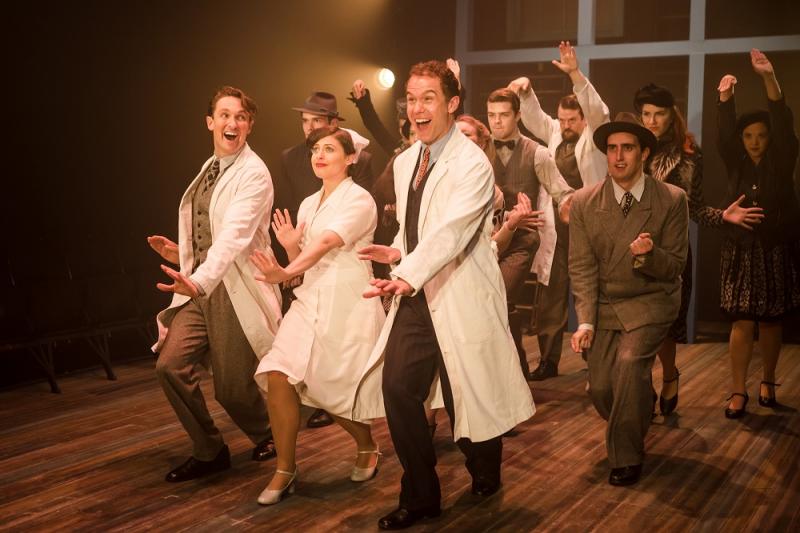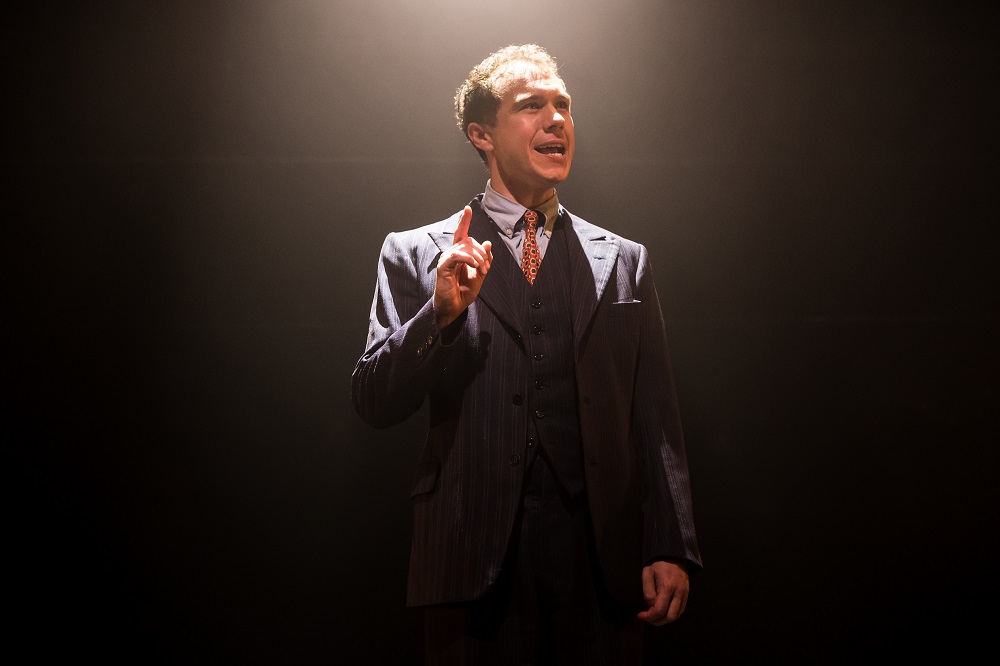Allegro, Southwark Playhouse | reviews, news & interviews
Allegro, Southwark Playhouse
Allegro, Southwark Playhouse
Experimental fable of compromise boasts a fine cast, but no good songs

Southwark's golden triangle – the Menier, the Playhouse and the Union – has given us so many "lost" musicals which only a decade or so ago would have been lucky to get in-concert airings.
Allegro is one of those bold efforts, to adapt Prokofiev, “good for the history of musicals, but not for musicals”. Its experimental use of a Greek-style chorus, which not only comments on the life of its hero from 0 to 35 but also embodies the characters’ thoughts at times, and its fluid, cinematic history lesson, account for the half-interest. Stephen Sondheim, who cut his teeth as gofer on the 1947 premiere, calls it “the show which shaped my professional life”. He eventually did it better in Merrily We Roll Along by working backwards from, rather than up to, the mid-life crisis of a self-compromised professional.
Joseph Taylor Jr, born into an honourable small-town family of medics, grows up to face the dilemma of serving the community or going for the well-paid career. The morality, Allegro’s authors insisted, isn’t about big city versus back in your own backyard, but the fact that humans “squander their time and usefulness for [sic] the wrong things”.

The problem is that the familiar R&H hominess which often plays out against an alluring, exotic background – be it the magic of the fairground or the exoticism of Siam or the South Pacific – is the dominant tone here, and it gives us a string of penny-plain, foursquare numbers in the first act (pictured above, Gary Tushaw and company including Julia J Nagle, second from right). Paradoxically, the musical idiom lightens up when Joe moves to a corrupt medical practice in Chicago and Andante finally becomes Allegro.
That title number initiates a dance sequence that catered for the choreographic skills of the premiere’s tyrannical director, Agnes de Mille - the instrumental music is much cut back here - while it’s a second-fiddle character, Nurse Emily, who gets the strongest solo, “The Gentleman is a Dope”, about her naïve boss, delivered with chutzpah by Katie Bernstein. The only other contender in the half-memorable stakes is for Joe’s mother, "A Fellow Needs a Girl", but since that has conventional sentiments about the role of home-making wife, it sticks in the craw a bit. You just have to accept the period setting, which takes us from 1905 to 1940 (further cue for nostalgia).
Still, Julia J Nagle strikes a touching note of truth and dignity both here and elsewhere, even when her torch song "Come Home" isn't remotely as moving as a parallel number like "You'll Never Walk Alone". It’s a shame that her strongest scene, with the mother confronting the opportunist potential daughter-in-law Jennie (Emily Bull, also excellent), isn’t set to music. Nor, crucially, is the protagonist’s meltdown – odd for the team which had already given Carousel's Billy Bigelow his big music-theatre “Soliloquy”; Gary Tushaw (pictured below) would have carried off something like that magnificently, as he does the spoken dialogue and what little he gets to sing.

The ensemble’s the thing, though. Director Thom Sutherland and choreographer Lee Proud make the most of the narrow space between the two banks of audience seats, getting the cast to wheel around trolleys with platforms of various heights to break the level playing field. Some of the Greek choruses inevitably seem twee to us now, but there’s a very funny scene with placards telling Jennie what to do to get what she wants from her husband, held up by the forces of convention while the “voices” of those who know what’s best for Joe wield different thought bubbles on the opposite side. The cast is uniformly good, and you realise what a fine team of women Sutherland has assembled when you get to hear the solos in the washing-line fast waltz “Money Isn’t Everything”, which bounces Act Two into life (the first act curtain, the wedding, is weak).
All the less reason, then, for miking in such a small space (the Arcola's Carousel remains a benchmark for what you can achieve without amplification). In sometimes odd balances, the fine eight-piece orchestra sometimes drowns the voices, chiefly that of Susan Travers as a dignified Grandma Taylor. It’s a shame, too, that the harmony groups are too deafening to enjoy for their natural resourcefulness.
Otherwise, could it be better done? Probably not, at least on this kind of scale. The first complete recording of Allegro, released in 2009, yielded only disappointment, and despite the extra kicks of a live show and more of the truthful dialogue here, the bottom line remains: Rodgers and Hammerstein’s fourth musical is an honourable experiment which won’t ever take the world by storm.
The future of Arts Journalism
You can stop theartsdesk.com closing!
We urgently need financing to survive. Our fundraising drive has thus far raised £49,000 but we need to reach £100,000 or we will be forced to close. Please contribute here: https://gofund.me/c3f6033d
And if you can forward this information to anyone who might assist, we’d be grateful.

Subscribe to theartsdesk.com
Thank you for continuing to read our work on theartsdesk.com. For unlimited access to every article in its entirety, including our archive of more than 15,000 pieces, we're asking for £5 per month or £40 per year. We feel it's a very good deal, and hope you do too.
To take a subscription now simply click here.
And if you're looking for that extra gift for a friend or family member, why not treat them to a theartsdesk.com gift subscription?
more Theatre
 Macbeth, RSC, Stratford review - Glaswegian gangs and ghoulies prove gripping
Sam Heughan's Macbeth cannot quite find a home in a mobster pub
Macbeth, RSC, Stratford review - Glaswegian gangs and ghoulies prove gripping
Sam Heughan's Macbeth cannot quite find a home in a mobster pub
 The Line of Beauty, Almeida Theatre review - the 80s revisited in theatrically ravishing form
Alan Hollinghurst novel is cunningly filleted, very finely acted
The Line of Beauty, Almeida Theatre review - the 80s revisited in theatrically ravishing form
Alan Hollinghurst novel is cunningly filleted, very finely acted
 Wendy & Peter Pan, Barbican Theatre review - mixed bag of panto and comic play, turned up to 11
The RSC adaptation is aimed at children, though all will thrill to its spectacle
Wendy & Peter Pan, Barbican Theatre review - mixed bag of panto and comic play, turned up to 11
The RSC adaptation is aimed at children, though all will thrill to its spectacle
 Hedda, Orange Tree Theatre review - a monument reimagined, perhaps even improved
Scandinavian masterpiece transplanted into a London reeling from the ravages of war
Hedda, Orange Tree Theatre review - a monument reimagined, perhaps even improved
Scandinavian masterpiece transplanted into a London reeling from the ravages of war
 The Assembled Parties, Hampstead review - a rarity, a well-made play delivered straight
Witty but poignant tribute to the strength of family ties as all around disintegrates
The Assembled Parties, Hampstead review - a rarity, a well-made play delivered straight
Witty but poignant tribute to the strength of family ties as all around disintegrates
 Mary Page Marlowe, Old Vic review - a starry portrait of a splintered life
Tracy Letts's Off Broadway play makes a shimmeringly powerful London debut
Mary Page Marlowe, Old Vic review - a starry portrait of a splintered life
Tracy Letts's Off Broadway play makes a shimmeringly powerful London debut
 Little Brother, Soho Theatre review - light, bright but emotionally true
This Verity Bargate Award-winning dramedy is entertaining as well as thought provoking
Little Brother, Soho Theatre review - light, bright but emotionally true
This Verity Bargate Award-winning dramedy is entertaining as well as thought provoking
 The Unbelievers, Royal Court Theatre - grimly compelling, powerfully performed
Nick Payne's new play is amongst his best
The Unbelievers, Royal Court Theatre - grimly compelling, powerfully performed
Nick Payne's new play is amongst his best
 The Maids, Donmar Warehouse review - vibrant cast lost in a spectacular-looking fever dream
Kip Williams revises Genet, with little gained in the update except eye-popping visuals
The Maids, Donmar Warehouse review - vibrant cast lost in a spectacular-looking fever dream
Kip Williams revises Genet, with little gained in the update except eye-popping visuals
 Ragdoll, Jermyn Street Theatre review - compelling and emotionally truthful
Katherine Moar returns with a Patty Hearst-inspired follow up to her debut hit 'Farm Hall'
Ragdoll, Jermyn Street Theatre review - compelling and emotionally truthful
Katherine Moar returns with a Patty Hearst-inspired follow up to her debut hit 'Farm Hall'
 Troilus and Cressida, Globe Theatre review - a 'problem play' with added problems
Raucous and carnivalesque, but also ugly and incomprehensible
Troilus and Cressida, Globe Theatre review - a 'problem play' with added problems
Raucous and carnivalesque, but also ugly and incomprehensible
 Clarkston, Trafalgar Theatre review - two lads on a road to nowhere
Netflix star, Joe Locke, is the selling point of a production that needs one
Clarkston, Trafalgar Theatre review - two lads on a road to nowhere
Netflix star, Joe Locke, is the selling point of a production that needs one

Add comment